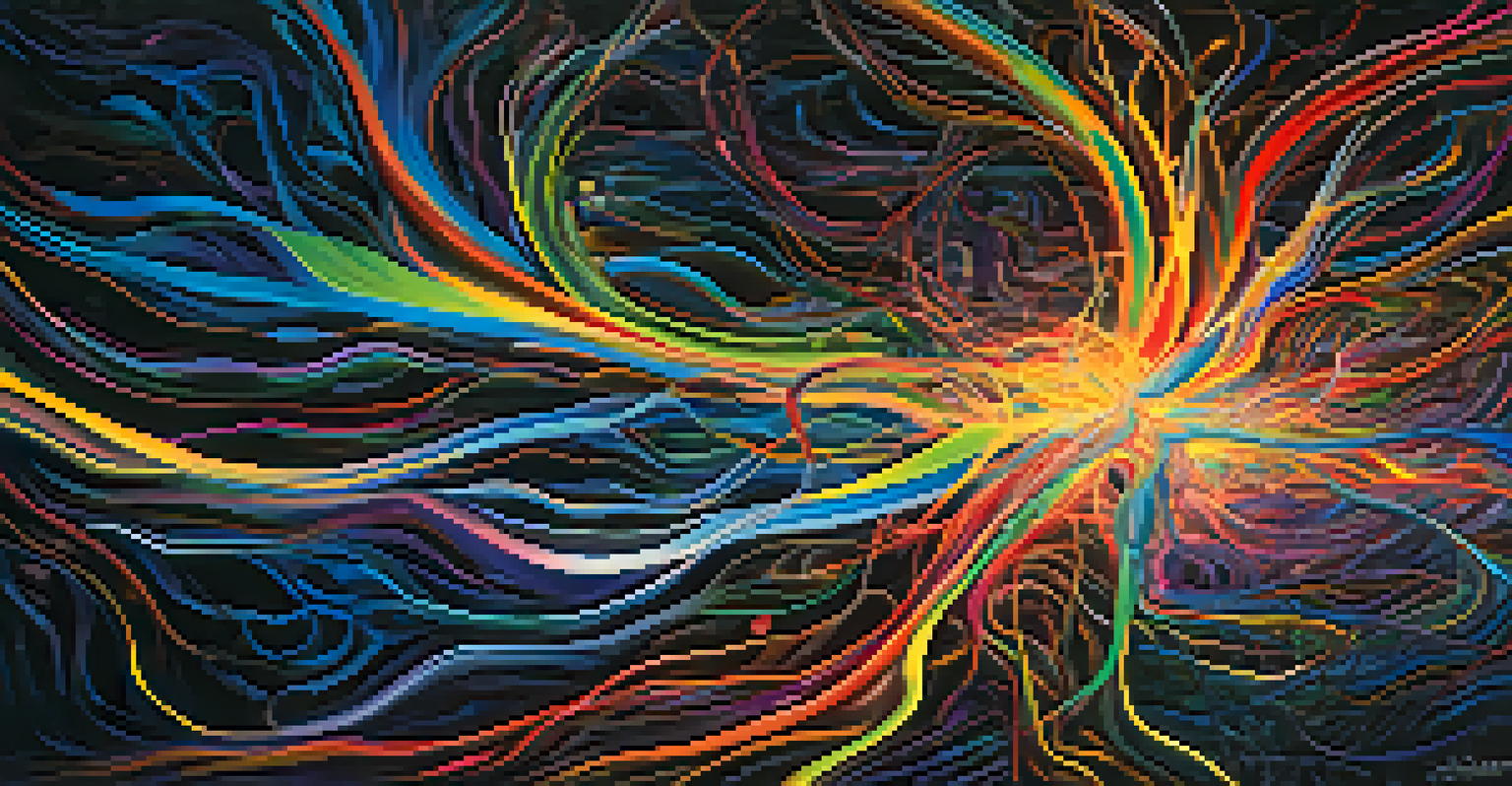Entheogenic Experiences: Memory Recall and Emotional Impact

Understanding Entheogens and Their Impact on the Mind
Entheogens are substances, often derived from plants, that induce altered states of consciousness, leading to profound experiences. Common examples include psilocybin mushrooms and ayahuasca, which have been used for centuries in various cultures for spiritual and healing purposes. These substances can create a bridge between the conscious and subconscious, unlocking memories and emotions that might otherwise remain hidden.
The mind is everything. What you think you become.
When individuals consume entheogens, they often report vivid experiences that can feel deeply personal and transformative. This intensity can lead to a greater understanding of oneself and one’s place in the world. Understanding this connection can help us appreciate how these experiences might influence our memories and emotional landscapes.
In recent years, scientific research has begun to explore the psychological effects of entheogens. Studies suggest they can lead to enhanced memory recall and emotional regulation, making them a fascinating subject for those interested in mental health and personal growth.
The Role of Memory Recall in Entheogenic Journeys
Memory recall during entheogenic experiences can be strikingly vivid, often resurfacing long-buried memories. Many users describe encounters with past events, sometimes with surprising clarity, as if they are reliving those moments. This phenomenon can lead to significant insights, as individuals reassess their past and its impact on their present lives.

As memories are recalled, emotions tied to those experiences can also be felt intensely. This emotional connection can facilitate healing, as individuals confront and process feelings they may have suppressed. By revisiting these memories, users often find a renewed sense of understanding and closure.
Entheogens Enhance Self-Discovery
Entheogens facilitate transformative experiences that deepen self-understanding and emotional insight.
Moreover, the context in which these memories are recalled can be transformative. The supportive environment often surrounding entheogenic experiences—whether it's a guided session or a safe space with friends—can help individuals feel secure enough to explore even the most challenging memories.
Emotional Impact: Healing Through Introspection
The emotional impact of entheogenic experiences can be profound, often leading to therapeutic benefits. For many, the ability to confront and process deep-seated emotions can result in significant personal growth. This journey into the self allows individuals to examine their feelings in ways they may never have considered before.
We do not remember days, we remember moments.
People often report feelings of relief and liberation after processing difficult emotions during these experiences. By understanding and accepting their feelings, they can begin to release the emotional burdens they've carried. This catharsis can be incredibly healing, fostering a sense of peace and acceptance.
Emotional healing through entheogens is not simply about feeling good; it's about gaining insight into one’s psyche. This process can help individuals develop healthier emotional responses, ultimately leading to improved well-being.
The Science Behind Memory and Emotion in Entheogens
Research into the science of entheogens reveals fascinating insights into how they influence memory and emotion. Studies indicate that substances like psilocybin may enhance neuroplasticity, the brain's ability to reorganize itself by forming new neural connections. This can play a crucial role in how we process memories and emotions.
When the brain is in a heightened state of neuroplasticity, it may be more receptive to change and healing. This means that during entheogenic experiences, individuals might be better equipped to reframe traumatic memories or emotional patterns. The implications for therapy are profound, suggesting that these substances could assist in treating conditions like PTSD or depression.
Memory Recall Aids Emotional Healing
Vivid memory recall during entheogenic journeys can help individuals confront and process suppressed emotions, leading to personal growth.
Additionally, the emotional openness often experienced during these journeys can lead to a greater willingness to confront difficult issues. This combination of emotional readiness and enhanced neuroplasticity creates a unique opportunity for personal growth and healing that traditional therapies may not always provide.
Navigating Challenges: The Dark Side of Entheogenic Use
While entheogenic experiences can be transformative, they are not without their challenges. Some individuals may encounter difficult emotions or memories that can be overwhelming. It’s important to approach these substances with caution and respect, recognizing that not every experience will be positive.
Fear, anxiety, or discomfort can arise during an entheogenic journey, sometimes leading to what is referred to as a 'bad trip.' These experiences can be alarming, but they often provide valuable lessons about the self. Learning to navigate these challenges is crucial for anyone considering exploring entheogens.
Support systems, whether through experienced guides or trusted friends, can play a vital role in ensuring a safer experience. Having someone to talk to and share feelings with can make all the difference, turning a potentially negative experience into a learning opportunity.
Integration: Making Sense of Entheogenic Experiences
Integration refers to the process of making sense of and incorporating insights gained from entheogenic experiences into everyday life. This is a crucial step in ensuring that the benefits of the journey are not lost once the experience is over. Without proper integration, the insights may fade, and the emotional healing might stall.
Many people find that journaling, therapy, or discussions with supportive communities can help facilitate integration. These practices allow individuals to reflect on their experiences and articulate their feelings, fostering a deeper understanding of what they’ve encountered. By processing these insights, they can apply them to their daily lives.
Therapeutic Potential of Entheogens
Growing research suggests that entheogens could be integrated into therapeutic practices to treat conditions like PTSD and depression.
Integration is not just about understanding the experience; it's about transforming it. By actively working to incorporate these lessons into their lives, individuals can create lasting change and continue their journey of personal growth.
The Future of Entheogens in Therapy and Healing
As interest in entheogens grows, so does the potential for their use in therapeutic settings. Researchers and mental health professionals are increasingly exploring how these substances can aid in treating various psychological conditions. The burgeoning field of psychedelic therapy holds promise for many seeking alternative treatments.
Clinical trials have shown that entheogens can lead to significant improvements in conditions like depression, anxiety, and PTSD. These findings suggest that there could be a valuable place for entheogens in modern medicine, alongside traditional therapeutic approaches. However, it’s crucial that their use is guided by professionals who can ensure safety and efficacy.

Looking ahead, the integration of entheogens into therapeutic practices could reshape how we approach mental health. By combining traditional methods with the profound insights offered by these substances, we may open new pathways for healing and self-discovery.